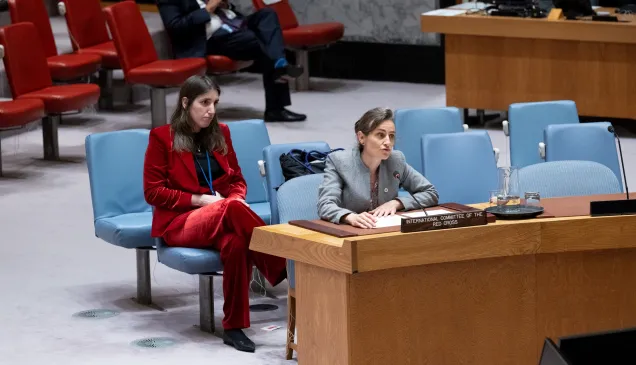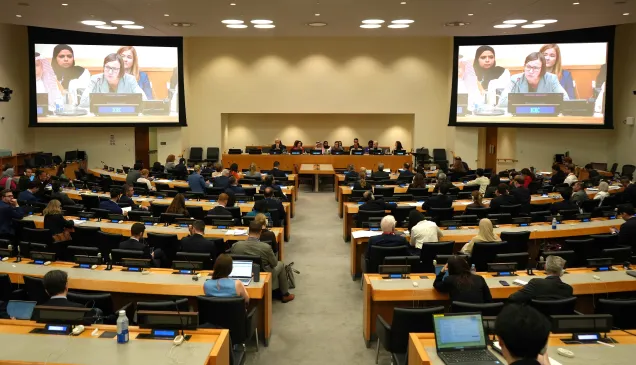Excellencies, ladies and gentlemen,
The 2020 Review Conference of the Treaty on the Non-Proliferation of Nuclear Weapons (NPT) is a critical opportunity at a critical moment. The risk of use of nuclear weapons is increasing. Previous restraints are steadily falling away. We see a shift from a focus on non-use and elimination to making the use of nuclear weapons possible or more likely.
In 2010, the States Parties to the NPT expressed their deep concern at the catastrophic humanitarian consequences of any use of nuclear weapons and reaffirmed the need for all States to comply with international humanitarian law. The Action Plan adopted that same year identified concrete steps for the total elimination of nuclear weapons and measures to reduce the risk of use of nuclear weapons. The 2020 NPT Review Conference is a key opportunity for States Parties to make urgent progress towards these goals.
The International Committee of the Red Cross, and the broader International Red Cross and Red Crescent Movement, have since 1945 been calling for the prohibition and elimination of nuclear weapons. Our call is grounded on our first-hand observation of the horrific effects of the atomic bombs in Hiroshima and Nagasaki, as we attempted to bring relief to the dying and injured victims. Our call is also based on our conclusion that nuclear weapons are generally incompatible with international humanitarian law and that if nuclear weapons were to be used again, we would be incapable of bringing adequate humanitarian assistance to the survivors as there is little capacity and no realistic or coordinated plan to deal with these tremendous challenges either at country or at the international level.
On 7 July 2017, 122 States responded to our call through the adoption of the Treaty on the Prohibition of Nuclear Weapons (TPNW). The TPNW's comprehensive prohibition of nuclear weapons creates a further disincentive for proliferation and represents a step towards implementing Article VI of the NPT. By signing and ratifying the TPNW, States are sending a clear signal that any use, threat of use or possession of these weapons is unacceptable in humanitarian, moral and legal terms.
Such a signal is needed more than ever in a world in which the risk of use of nuclear weapons is increasing. Specifically:
- Firstly, military incidents between nuclear weapon States are occurring with disturbing frequency. The risk that nuclear weapons could be used may be greater today than during the Cold War.
- Secondly, states possessing nuclear weapons are adapting their weapons systems rather than eliminating them. In parallel, their command and control systems have become more vulnerable to cyber-attacks.
- And thirdly, erosion of the nuclear disarmament and arms control framework signals a worrying trend towards a new nuclear arms race.
In light of these disturbing developments, concerted efforts to reduce nuclear risks are urgently needed. The NPT was developed in response to the devastation that would be visited upon all mankind by a nuclear war. Most States today acknowledge that nuclear weapons cannot credibly be viewed as instruments of security. When used even on a limited scale, nuclear weapons would have catastrophic and long-lasting humanitarian consequences. Most States see nuclear weapons as a major source of insecurity for their populations and for future generations.
Irrespective of their view of the TPNW, all NPT States Parties should reaffirm the humanitarian rationale that motivated the development of the NPT in the first place, and urgently implement long-standing risk reduction commitments.
In the view of the ICRC, States must, as a matter of urgency:
- Commit unequivocally never to use nuclear weapons first.
- Remove nuclear weapons from "hair trigger" alert status.
- Commit to provide pre-notification of military exercises that may involve the launch of missiles or other vehicles associated with nuclear weapons.
- Re-establish joint early-warning centers to clarify in real-time unexpected and potentially destabilizing events.
- Reduce the role of nuclear weapons in security policies.
Excellencies, ladies and gentlemen,
The ICRC firmly believes that disarmament and non-proliferation are not just tools to maintain international peace and security. They are also critical means to mitigate the impact of armed conflict when it occurs. This is also the aim of IHL. Respecting and ensuring respect for IHL in armed conflict, including its rules prohibiting or limiting the use of certain weapons, is a fundamental responsibility of States.
The NPT contains a vision of security without nuclear weapons, one that is more viable and humane, and which States Parties have long promised to achieve. This vision must guide NPT States Parties in their preparation for the 2020 Review Conference.
Thank you.



